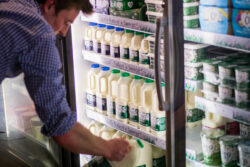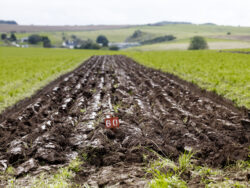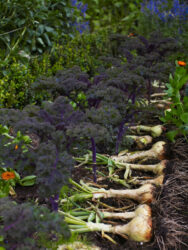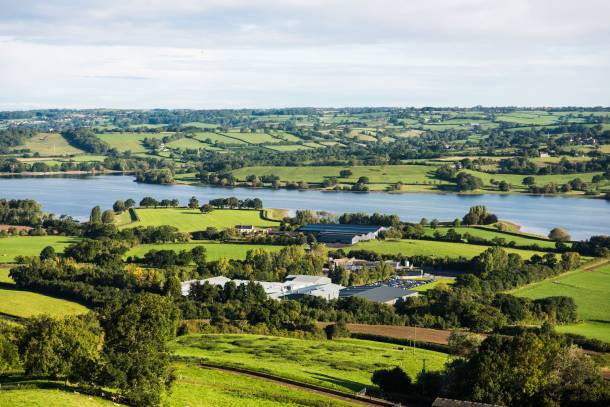Friday 2nd September 2022
To celebrate Organic September, we have created a blog series that will put an end to some of the most common organic myths!
Lizzie Rivera, founder of ethical lifestyle website Live Frankly, has taken some time out from her busy schedule to interview Head Gardener at Yeo Valley Organic Garden, Sarah Mead, Soil Association’s Senior Business & Trade Development Manager, Lee Holdstock, and Riverford CEO, Rob Haward, who have shared some wisdom on a wide range of organic myths.
MYTH #1: Organic food is always more expensive

THE OTHER SIDE OF THE STORY: “That organic products are always more expensive is a commonly held myth and it isn’t always true. It depends on where you shop and what you buy. We do lots of price comparisons, a recent one was comparing supermarket own label tea bags with organic ones – and it was the same price for 80 bags.
That said, we’re facing a cost of living crisis on top of a global health, climate and nature crisis. We have some big societal challenges around low incomes and access to good food. I reject the notion that the solution is that people who are struggling should be forced to eat food that’s not great for them or the planet.” Soil Association’s Senior Business & Trade Development Manager, Lee Holdstock
“It’s not always more expensive, but it is often true. I know it’s easy for me to say, but I think it’s about value. In the UK, just over 8% of household spend goes on food. That’s a lot less than most other countries. Too many of us are used to picking up what we fancy for dinner each night, without questioning if the produce is in season or considering the value of then animal that has lived and died for that meal. We need to attach more value to what we’re putting in our mouths and bodies.” Sarah Mead, Head Gardener, Yeo Valley Organic Garden
MYTH #2: Organic farming can’t feed the world

THE OTHER SIDE OF THE STORY: “A common argument is that organic farming needs more land than so-called conventional farming to feed the world. But, the alternative is big agriculture, which has set us on course for 90% soil erosion by 2050. This means it can only feed the world for so long, so we must look at this argument in terms of longevity, as well as the space required.
As such, conventional farming as it is today, is not a viable alternative for the future. The solution has to be to work with nature, not against it. Organic farming does this and creates the soil diversity we need for long-term farming stability.
Does that mean we can carry on consuming as we are? No. Firstly, we already produce enough food to feed the world, we just don’t get the food to the right places. That needs to change so there’s not a high amount of food waste in some countries and lack of food in others. Secondly, we need to shift our diets to be more plant-based and eat in-line with the seasons so that instead of air-freighting strawberries to the UK in January (at Riverford we never use air freight) we’re enjoying them in summer, when they are in season here.” Riverford CEO, Rob Haward
MYTH #3: Vegan is better than organic
THE OTHER SIDE OF THE STORY:

“I love discussing this. I think at Yeo Valley Organic our values are close to those of vegans in a lot of respects. When it comes to animal welfare and farming practices, we comply with a lot of vegan views. Patently, we’re not going to agree on drinking milk. And that’s OK. The beauty of living in a democracy is everyone being able to have different opinions.” Sarah Mead
“In the UK, we are now seeing that the rise in veganism is linked to a big rise in fruit and veg sales. Nationally, there is more growth in the processed vegan foods sector – and often these foods are made from pea or soy protein, which can be highly processed and high in fats and salt. I don’t think this solution is the right one for our health or for the planet because it’s potentially a different form of mass-produced food manufacturing, and I fear it could end up supporting the same intensive farming practices.
We need to eat more fresh fruit and vegetables and less, but better meat, and we need an approach to this that is good for us and good for the planet. Organic farming offers this.” Rob Haward
Head over to our Organic September hub to learn more about how you can participate!
For more organic myths, head to Part 2!





Great read!
I feel organic food packages should have new labelling.
Eg. Pesticide free on organic fruit and veg
And on non organic should read : contains traces of pesticides..
same with meat and antibiotics.
Many of the general public do not understand what organic means. Many think it means grown in the wild, odd shapes and muddy
It has taken until reaching the age of 62 to fing out what me feel do frequently ill and unable to permently shed excess body wieght despite for many years being an active sportsman.
Eight months ago I stopped having any sugar and absolutely no starch ie bread, rice, and loads of different cereals. Lactose free milk, tons more vegetables, and really good quality meat but less of it and fish fish fish. We’ve found wild fruit trees locally apples and damsons and strawberries. It is amazing what there is out there in our countryside. I went from 82kg to 70kg in just six weeks and have never regained any wieght since. I can ride my road racing bike up hills like a rider half my age now! The othet upside is that it is cheaper on my new found diet of healthy food because I simply eat less as I feel less hungry throughout the day.
As you say Current farming practices aren’t sustainable. We need animals to produce organic fertilizer and while they’re helping us out with that, we should harvest their milk to keep them healthy.
It’s just how we use the milk, and whether we breed high milk production into the herd is the question?
In earlier times every small holder had some form of manure producing creature, that could also be generally milked.
Well done with the teabags but 99.9% of the time, organic stuff IS more expensive, sometimes ridiculously so.
I understand that yields from intensive farming will be higher, but so will their outgoings for all the fertilisers, sprays etc be too.
This is an area that I would like to understand much better. Sometimes I think organic products are just taking the natural ureic acid, with their prices…